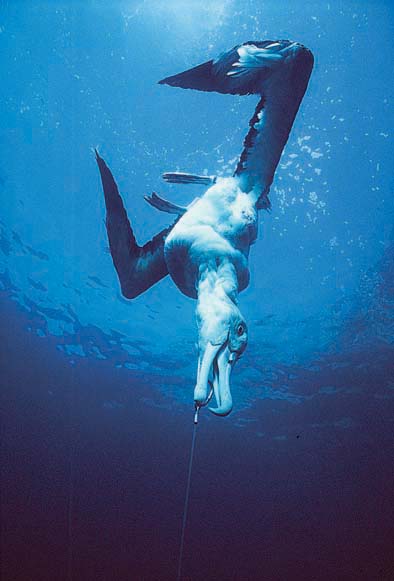
Hooked! Photograph by Graham Robertson
Can Zhou (Department of Fish and Wildlife Conservation, Virginia Polytechnic Institute and State University, Virginia, USA) and colleagues have published in the journal Biological Conservation on assessing seabird bycatch loss rate variability in pelagic longline fisheries.
The paper’s abstract follows:
“The incidental mortality of seabirds from fisheries ranks as the greatest threat impacting seabirds globally. However, its impact on seabird populations may have been substantially underestimated due to lost, undetected bycatch. To estimate the full extent of the bycatch problem, knowledge about the magnitude and variability of lost bycatch is necessary. Based on a long-term dataset, this study aims to facilitate the loss-corrected bycatch estimates for pelagic longline fisheries that do not have a concurrent bycatch loss observation component. We analyze information from all types of fishery interactions of seabirds to improve the estimate of bycatch loss rate and also reveal its variability. Specifically, we analyze how environmental and ecological factors affect seabird bycatch loss rate using Bayesian state-space models. Results show strong species effects in the bycatch loss rate. Inclement weather and strong competition among seabird species also affect bycatch loss rate. Estimates of the species-specific bycatch loss rate indicate that, for some species, the loss can well exceed the average loss rate, suggesting that seabird bycatch loss cannot be further ignored in assessing the fishery impact on seabird populations. To gauge the full scale of seabird bycatch, it is critical to account for this lost bycatch in bycatch assessments, at minimum, using an average loss rate with the ultimate goal of species-specific loss-corrected assessments.”
With thanks to Nigel Brothers.
Reference:
Zhou, C., Brothers, N., Browder, J. & Jiao, Y. 2020. Seabird bycatch loss rate variability in pelagic longline fisheries. Biological Conservation doi.org/10.1016/j.biocon.2020.108590.
John Cooper, ACAP Information Officer, 26 May 2020

 English
English  Français
Français  Español
Español